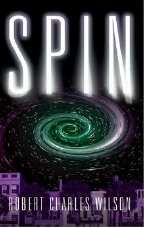 |
 Robert Charles Wilson
Robert Charles Wilson
No Heaven
Reviewed by: Rick Kleffel © 2005
Tor / Tom Doherty Associates
US Hardcover First Edition
ISBN 0-765-30938-6
Publication Date: 04-01-2005
364 Pages; $25.95
Date Reviewed: 06-21-05
Index:
Science Fiction
General Fiction
"Overhead, without any fuss, the stars were going out." The concluding sentence to Sir Arthur C. Clarke's short story "The Nine Billion Names of God" is surely one of the most memorable in science fiction, capturing the quiet, inevitable feel of an impending apocalypse already in progress. 'Spin', the latest and most powerful work by Robert Charles Wilson, begins with this fetching image and follows it with a finely written novel of character and speculation. Beautifully crafted on all levels, 'Spin' is one of those novels that you should probably buy two copies of -- one to read and one to loan to your friends. And you'll be wanting to do so before you've even finished it. Even without the speculative elements, 'Spin' is simply a great novel. But Wilson has cooked up the kind of imaginative leaps that draw readers to science fiction in the first place. Your sense of wonder need not be accompanied by a PhD to enjoy 'Spin'.
At heart, 'Spin' is the tale of a family that is both over-clocked and undermined, told by the outsider who never quite manages to make the connections he wishes for. The Lawtons own the Big House, a mansion big enough to house the driven but not brilliant patriarch, E. D. Tyler Dupree lives in the small house with his mother, the housekeeper, but is allowed to form a friendship with E. D.'s kids, Jason and Diane. Jase is brilliant but easily molded by his dynamic father. His sister Diane is smart, but she's not in Jason's or E. D.'s league; unfortunately, she's not in Tyler's either, for entirely different reasons. E. D.'s wife, Carol is a one-time doctor who is disappearing into a haze of alcoholism. She's barely even fazed by the disappearance of the stars in the night sky, the phenomenon that comes to be known as the Spin.
Wilson's invention here is every bit as brilliant as those of his characters, and frankly, the less said about it the better for the reader. I'd go so far as to recommend ignoring the dust jacket and plunging directly into Wilson's world. He's got lots of surprises for science fiction readers, the kind of "wish I had thought of that" ideas that are the result of lots of research and lots of imagination. But every revelation -- and there are plenty of them, lasting right up until the final pages of the novel -- is something that's a big idea yet easy to comprehend. Wilson has the sense of wonder down so well that while reading 'Spin', which seems entirely contemporary in every sense, you will feel as if you're back in the heyday of the first great science fiction novels. The comparisons become obvious once you read the novel, and I won’t spoil your enjoyment as a reader by pointing them out. But 'Spin' engenders these comparisons because it feels every bit as real, as new and as exciting as the classics did in their day. As you read 'Spin', it's impossible not to think that it's a classic as well.
Wilson distinguishes himself in many ways with his latest novel, not the least of which is his carefully wrought prose. 'Spin' is told in the first person by Tyler Dupree, and cleverly constructed so as to keep the mysteries alive and the pages turned so compellingly that there will be no sleep for the reader. The novel has an elegiac feel to it, but bolts of hope and imagination illuminate the twilight landscape. Wilson adroitly captures the feel of our lives, the rush and hurry towards an important and compelling conclusion that for us is ambiguous, but that he manages to reveal in a fully satisfying manner. Tyler is the perfect foil for the Lawton clan. E. D. manages to make the most of the apocalypse, building a business empire on retrograde technology that suddenly becomes current. More importantly, he's building an heir in Jason. Jason is the brilliant light that burns brightly, a smart young boy who is transformed by E. D., his own brilliance and the Spin. And as Jason is transformed by his circumstances, so is the rest of the human race by theirs.
In the end, 'Spin' is a novel that addresses the classic science fiction theme of transcendence with elegance, intelligence and imagination. We all seek to achieve a state beyond the day-to-day lives that we must endure. Some look within, and others without, and both directions lead back to one another and then somewhere else entirely. Wilson captures this complex paradox of our lives as we live them and wish to live them. He captures the rush towards tomorrow without having to rush. One hopes upon closing the covers that 'Spin' might achieve the kind of gravity, the escape velocity to slip between the boundaries that separate genre fiction from a world that needs books like this. A world that is moving swifter than it knows into a future that we are creating without knowing a single thing. Certain only that we know less than we need to, but more than we should. If in avoiding apocalypse we achieve transcendence, our next state of being will be no more certain than the world we know now. We can live in a constant state of wonder, even if the stars continue to shine in the night sky.
|
 |
